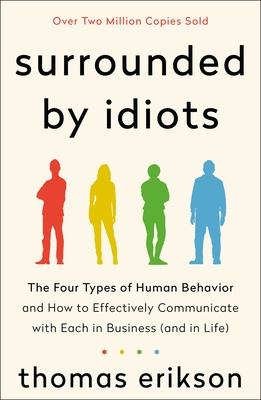More on this book
Community
Kindle Notes & Highlights
Read between
October 1 - November 20, 2024
leaning into my Red/Blue nature while studying accounting and computer science.
There and then I decided to learn what is probably the most important knowledge of all—how people function. I would be encountering people for the rest of my life, no matter what my profession was, and it was easy to see that I would benefit by being able to understand them.
DISC—an acronym that stands for Dominance, Inspiration, Stability, and Compliance ability—system.
Everything you say to a person is filtered through his frames of reference, biases, and preconceived ideas.
By adjusting yourself to how other people want to be treated, you become more effective in your communication.
You help other people understand you by creating a secure arena for communication—on their terms.
Flexibility and the ability to interpret other people’s needs is what characterizes a good communicator.
“We see what we do, but we do not see why we do what we do. Thus, we assess and appraise each other through what we see that we do.”
In any other situation, it might be a good idea to understand how you are perceived and to learn how other people function.
The stronger your self-understanding is, the greater your probability of adapting to the people around you.
BEHAVIOR = f (P × Sf) Behavior is a function of Personality and Surrounding factors. Behavior is that which we can observe. Personality is what we try to figure out. Surrounding factors are things that we have an influence on.
About 80 percent of all people have a combination of two colors that dominate their behavior. Approximately 5 percent have only one color that dominates behavior. The others are dominated by three colors.
Entirely Green behavior, or Green in combination with one other color, is the most common. The least common is entirely Red behavior, or Red behavior in combination with one other color.
But a Red detests inactivity. Things must happen. Add to this a sense of constant urgency, and a great deal will get done.
With their incurably positive outlook on life, Yellow individuals give joy to the people around them with their cheerful acclamations and entertaining jokes.
You often find Greens in the public sector, where they help others, with no concern for personal gain.
In general, my advice is to listen attentively when Blues do actually talk, because they’ve usually thought through what they say.
Many people become hugely frustrated by this limitless verbosity. It’s often perceived as egocentrism. The terms “windbag,” “verbal diarrhea,” and “motormouth” were more than likely coined with Yellows in mind.
This is the paradox. The bigger the plans, the less likely it is that a Green will commit. All he wants is peace and quiet.
Lots of work is a Green’s greatest enemy, just because that’s exactly what it is—work. They live in a mind-set that everything should be easy.
You could conclude that a really good party consists of sober Yellows and Blues who are slightly under the influence.
A man once said (admittedly with an ironic smile on his face, but still) that the test of intelligence is simple: “If you agree with me, then you’re intelligent. However, if you don’t agree with me, then you are clearly and undoubtedly an idiot.”
Further Reading


